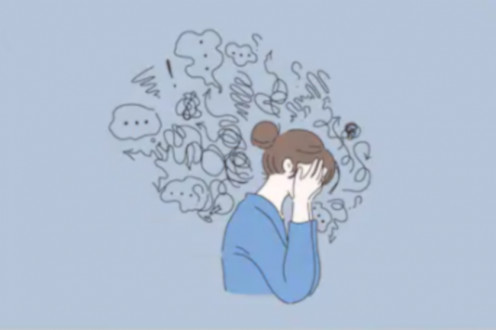Is There a Relationship Between Negative Self-Talk and Depression?

Negative Self-Talk Might Not Be Depression, But It's Close
It may not be a sign of clinical depression, but negative self-talk can still have devastating effects on feelings of well-being. Negative self-talk, at least the kind I am talking about in this article, is not the same thing as being clinically depressed. However, I do believe there is a "kinship" between negative self-talk and depression, and that negative self-talk can sometimes signal the potential for becoming depressed, if it is not addressed. While the topic/discussion of clinical depression is better left to medical doctors, I can say that I believe negative self-talk is something that depressed or "near-depressed" people, most likely, engage in more often than people who are not depressed.
We all go through the regular ups and downs of life. During those non-clinical, self-manageable, "down days," when someone is feeling blue, they are more prone to negative self-talk. Then, by engaging in it, the negative self-talk feeds feelings of sadness or hopelessness, which in turn fuels more negative self-talk, and ultimately, the vicious cycle created ends up prolonging the time it can take to get beyond or come out of a temporary "funk."
It is important, especially during “down” days that you learn to pay attention to what you are saying to you. Words have awesome power. They can hurt, and they can heal. Knowing this, you must make up your mind to use the healing power of words spoken from you to you, to turn the talk around. Listen to what you're saying, then make sure you correct any belittling or berating words or thoughts with words of encouragement.

Ending Negative Self-Talk Pity Parties
It is important, on days when you feel like throwing a "pity party" for one, that you have a reliable way for pulling yourself up and out of any type of funk you may have allowed yourself to wander into. My source of comfort and guidance is always the Bible, and I'm glad to report that the Good Book provides some of the best insight to be found when it comes to understanding the power of words. In Proverbs, 18:21, it says there is life and death in the power of the tongue. That means what you say to yourself, silently or audibly, can either uplift or condemn your spirit. And Romans 4:17 speaks to the power of simply believing in yourself; believing that you can achieve something so wholeheartedly, that your belief will help propel you toward making it so. It says we should “call those things which be not as though they were.”
When anyone is feeling down, instead of hearing self-talk that uses negative words emphasizing or amplifying the sadness they are experiencing, what they need to hear from self, instead, are positive words offering comfort and encouragement. Sure, it might feel good, for a brief time, to drown your sadness listening to the Blues, or even Country Western music (something echoing what you're feeling inside). But after a while, hearing negative words from others (through music or otherwise) and from yourself, through self-talk, will only help to immobilize you inside your sadness. It will help to convince you that there is no use in even trying to feel better, or that there is no reason to become involved in spirit-lifting, problem-solving activities.

When I'm down in the dumps, I know my thinking can become skewed toward the irrational, and only a few of my thoughts may be rational. During times like these, I tend to amplify any negative thing that happens or that affects me, and I minimize those things that may be positive. A good example might be the “off day” you experience when you don't get a good night’s sleep the night before. On days like that, for me, my thoughts and my self-talk tends toward the negative and unhelpful, because I'm suffering from a lack of sleep. Since I know this about myself, on days when I know I'm sleep deprived, I try to be especially kind to me in my self-talk.
When you are down or blue, your mind will often focus on the negative. It may even exaggerate the negative, and quickly jump to negative conclusions. Simple things in life that should be molehills might begin to loom before you as mountains. Little things that wouldn’t ordinarily bother you can begin to feel like overwhelmingly “big deals.” Things that are usually easy, so easy you normally take them for granted, can become difficult, or nearly impossible to do.

Learning to Say Goodbye to Negative Self-Talk
How does someone get out of this negative spiral? If it is allowed to continue, it can continue indefinitely, because as I said earlier, it feeds on itself. Negativity breeds negativity. If left unchecked, it can spiral out of control, and your own thoughts and negative self-talk can quickly lead you to become your worst enemy. You day can become a bad day before the day even dawns, because you will have thought it, and you will have talked yourself into preparing to have yet another bad day. But it doesn't have to be that way. With more thought and introspection, you can combat those negative thoughts and replace them with positive ones.
There are so many recurring and negative themes in life that so many people, including me, need to examine, I am considering writing a self-help book that could easily become a series. And, as a series, although it could go on forever and ever, my only goal for writing will be to help anyone who wants to find a way beyond and out of negative self-talk. It will be for those who are looking for more positive ways to deal with the recurring negative themes that life brings, so that they can see, more clearly, a way to turn negative moments into positive results.
Finally, it is my prayer that those who are feeling down or blue, who tend to beat up on themselves consistently and too much, will internalize the lessons of this article and other articles I have published on this topic. I believe that if readers will work to embrace positive thoughts; if they learn to replace negative self-talk with positive thoughts, instead, they will begin to realize it is possible to handle, fairly easily, many of the recurring themes that keep stopping by for a "negativity visit." By practicing turning negative thoughts and ideas into positive ones, again and again, I believe positive self-talk can become not just a habit, it will become the foundation for being able to change, for a better life, what you are saying to yourself through self-talk.
© 2012 Sallie B Middlebrook PhD








